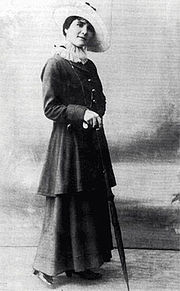Florbela Espanca
| Florbela Espanca | |
|---|---|
 |
|
| Born | Flor Bela d'Alma da Conceição 8 December 1894 Vila Viçosa, Portugal |
| Died | 8 December 1930 (aged 36) Matosinhos, Portugal |
| Occupation | Poet |
| Nationality | Portuguese |
| Period | 1894–1930 |
Florbela Espanca (Portuguese: [floɾˈbɛlɐ (ɨ)ʃˈpɐ̃kɐ]; born Flor Bela d'Alma da Conceição; 8 December 1894 – 8 December 1930) was a Portuguese poet known for her erotic and feminist writing.Fernando Pessoa later said she was his "twin soul".
Born Flor Bela d'Alma da Conceição on 8 December 1894 in Vila Viçosa, Portugal, Espanca was the daughter of Antónia da Conceição Lobo who worked as a housemaid for Espanca's father, João Maria Espanca, a photographer and businessman. Her father's wife, Mariana do Carmo Inglesa Espanca, who was unable to have her own children, agreed for Espanca to live in their home, where she was raised from birth by both her father's wife and her biological mother, who was 15 years old when Espanca was born. Since her parents weren't married, when Espanca was baptized on 20 June 1895, she was christened as Flor Bela Lobo, the daughter of Antónia Lobo and an unknown father. Her father, whom Espanca referred to in a poem as "dear Daddy of my soul", officially claimed paternity in 1949, 19 years after Espanca's death.
Espanca's full brother, Apeles Espanca, was born in 1897 and was also baptized as the child of an unknown father. In 1903, Espanca wrote her earliest known poem, "A Vida e a Morte" (Life and Death), when she was 8 years old. In 1908, her mother died at the age of 29 with "neurosis" recorded as her official cause of death. A few months after her mother's death, Espanca became one of the first female students to enroll in the Liceu André de Gouveia, a traditionally male school in Évora, Portugal.
In 1913, Espanca failed a final examination and dropped out of school, and on her 19th birthday, she married Alberto Moutinho, a longtime friend and classmate. Espanca and Moutinho moved to Redondo, Portugal, where they both worked as teachers. Espanca taught French, English, geography, and history and Moutinho taught science. In 1915, due to financial difficulties, they moved in with Espanca's father in Évora and continued teaching. From 1915 to 1917, she collected all of her poems into a work entitled O livro D'el (His book) that she dedicated to her brother.
In 1916, Espanca re-enrolled in secondary school at the Liceu de Évora. After graduating in 1917, she and Moutinho moved to Lisbon so Espanca could attend the University of Lisbon, where she was one of seven women, out of a total of 313 students, enrolled in the School of Law. Six months later, Espanca had a miscarriage and took a temporary break from university in order to recover in the southern region of Algarve, away from the capital city of Lisbon. She had another miscarriage in 1919 and around the same time, Espanca began to show the first serious symptoms of mental illness. Later that same year, Livro de Mágoas (The Book of Sorrows) was published. In 1921 Espanca and Moutinho divorced, which exposed her to significant social prejudice.
...
Wikipedia
